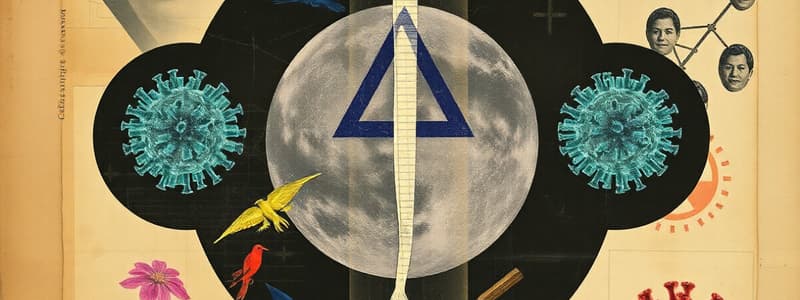Podcast
Questions and Answers
What is a significant feature of cancer cells that aids in immune detection?
What is a significant feature of cancer cells that aids in immune detection?
- They are incapable of undergoing apoptosis.
- They express surface antigens not present on normal cells. (correct)
- They produce more cytokines than normal cells.
- They have an increased amount of IL-2 receptors.
Which cytokine is specifically mentioned as enhancing the immune response against cancer?
Which cytokine is specifically mentioned as enhancing the immune response against cancer?
- IL-10
- IL-2 (correct)
- IL-4
- IL-6
What primary function does IL-11 serve in the body?
What primary function does IL-11 serve in the body?
- Inducing apoptosis in cancer cells.
- Stimulating the production of platelets. (correct)
- Inhibiting the differentiation of bone marrow cells.
- Promoting the proliferation of lymphocytes.
The structure of IL-11 is characterized by what key features?
The structure of IL-11 is characterized by what key features?
How does IL-2 promote T-cell proliferation?
How does IL-2 promote T-cell proliferation?
In what way has IL-2 been used therapeutically in cancer treatment?
In what way has IL-2 been used therapeutically in cancer treatment?
What effect does IL-11 have on patients undergoing chemotherapy?
What effect does IL-11 have on patients undergoing chemotherapy?
What is a potential outcome of immunostimulation with IL-2?
What is a potential outcome of immunostimulation with IL-2?
What is a primary function of cytokines in the immune system?
What is a primary function of cytokines in the immune system?
Which of the following cytokines is NOT classified as an interleukin?
Which of the following cytokines is NOT classified as an interleukin?
What mechanism allows cytokines to trigger identical responses in different target cells?
What mechanism allows cytokines to trigger identical responses in different target cells?
In terms of cytokine signaling, what is the role of the high-affinity effector domain?
In terms of cytokine signaling, what is the role of the high-affinity effector domain?
How do cytokines demonstrate synergy in immune responses?
How do cytokines demonstrate synergy in immune responses?
What is a common application of IL-2 in biopharmaceuticals?
What is a common application of IL-2 in biopharmaceuticals?
Which of the following best describes the structure of IL-2?
Which of the following best describes the structure of IL-2?
What aspect of IL-2 receptor interaction is crucial for its function?
What aspect of IL-2 receptor interaction is crucial for its function?
Which of the following interleukins are produced by endothelial cells, fibroblasts, monocytes, and keratinocytes?
Which of the following interleukins are produced by endothelial cells, fibroblasts, monocytes, and keratinocytes?
What is the primary role of IL-1 in the immune response?
What is the primary role of IL-1 in the immune response?
What is notable about the amino acid homology of IL-1 α and IL-1 β?
What is notable about the amino acid homology of IL-1 α and IL-1 β?
Which property differentiates IL-1 from other interleukins regarding glycosylation?
Which property differentiates IL-1 from other interleukins regarding glycosylation?
Which of the following functions is NOT a role of IL-1?
Which of the following functions is NOT a role of IL-1?
Which is the most accurate representation of the molecular weight of interleukins?
Which is the most accurate representation of the molecular weight of interleukins?
What best describes the action exhibited by IL-1 in the immune response?
What best describes the action exhibited by IL-1 in the immune response?
What technology has facilitated the production of interleukins in sufficient quantities?
What technology has facilitated the production of interleukins in sufficient quantities?
Flashcards
IL-2's anticancer effect
IL-2's anticancer effect
IL-2 stimulates the immune system to attack cancer cells.
Cancer cell antigens
Cancer cell antigens
Cancer cells have unique surface markers not found on normal cells.
Immunostimulation & Tumor Detection
Immunostimulation & Tumor Detection
Boosting the immune system can improve the ability to detect tumors.
IL-11 function
IL-11 function
Signup and view all the flashcards
IL-11's therapeutic use
IL-11's therapeutic use
Signup and view all the flashcards
IL-11's liver effect
IL-11's liver effect
Signup and view all the flashcards
Platelet Importance
Platelet Importance
Signup and view all the flashcards
Chemotherapy side effects
Chemotherapy side effects
Signup and view all the flashcards
What are Interleukins?
What are Interleukins?
Signup and view all the flashcards
What is the role of Interleukins in immune responses?
What is the role of Interleukins in immune responses?
Signup and view all the flashcards
What is IL-1?
What is IL-1?
Signup and view all the flashcards
How are IL-1α and IL-1β similar?
How are IL-1α and IL-1β similar?
Signup and view all the flashcards
How are IL-1α and IL-1β different?
How are IL-1α and IL-1β different?
Signup and view all the flashcards
What is IL-1's role in inflammation?
What is IL-1's role in inflammation?
Signup and view all the flashcards
What is the effect of IL-1 on B-lymphocytes?
What is the effect of IL-1 on B-lymphocytes?
Signup and view all the flashcards
How is IL-1 produced?
How is IL-1 produced?
Signup and view all the flashcards
Cytokines: What are they?
Cytokines: What are they?
Signup and view all the flashcards
Cytokine Functions
Cytokine Functions
Signup and view all the flashcards
Cytokine Signalling: Receptors
Cytokine Signalling: Receptors
Signup and view all the flashcards
Cytokine Synergy
Cytokine Synergy
Signup and view all the flashcards
Cytokine Antagonism
Cytokine Antagonism
Signup and view all the flashcards
Cytokine Pleiotropy
Cytokine Pleiotropy
Signup and view all the flashcards
Cytokine Redundancy
Cytokine Redundancy
Signup and view all the flashcards
Cytokine Pathway Activation: Cascade
Cytokine Pathway Activation: Cascade
Signup and view all the flashcards
Study Notes
Biopharmaceuticals
- Biopharmaceuticals are regulatory proteins secreted by hematopoietic and non-hematopoietic cells.
- They modulate innate and adaptive immune systems.
- They influence immune system development, cell growth, differentiation, and the inflammatory cascade.
Cytokines
- Coined in 1974 by Stanley Cohen.
- A group of regulatory proteins.
- Include interleukins (ILs), interferons (IFs), tumor necrosis factor alpha (TNF-α), growth factors (EGF, IGF), and transforming growth factors alpha, beta, and gamma (TGF-α,β,γ).
Cytokine Signaling Pathway 1
- Cytokines signal through binding to transmembrane receptors.
- Low-affinity ligand-binding domains ensure cytokine specificity.
- High-affinity effector domains activate target genes through intracellular signaling.
Cytokine Signaling Pathway 2
- Cytokines can act in several ways.
- Synergy: combined action produces a different result than individual actions.
- Antagonism: cytokines counteract each other's actions.
- Pleiotropy: one cytokine can affect multiple target cells.
- Redundancy: multiple cytokines can trigger similar responses.
- Pathway activation: a chain reaction or cascade of cytokine actions.
Interleukins
- A large group of cytokines with molecular weights (MWs) ranging from 15 to 30 kDa.
- 33 different members (IL-1 to IL-33).
- Mostly glycosylated, except for IL-1.
- Produced by various cell types (at least 17).
- Bind to specific receptors on target cells.
- Primarily exhibit paracrine activity, with some autocrine activity.
IL-1
- Known as Lymphocyte activating factor (LAF) with two distinct forms (IL-1α and IL-1β).
- Bind to the same receptor, inducing similar biological activity.
- Share 20% amino acid homology and arise from different genes on chromosome 2.
- Secreted as precursors, cleaved to mature polypeptides.
- Non-glycosylated.
IL-1 Biological Activities
- Pro-inflammatory cytokine that promotes the synthesis of enzymes (e.g., proteases) and generates inflammatory mediators.
- At high levels, it acts in an endocrine manner, inducing fever and general body wasting.
- Linked to some cancers.
- An IL-1 antagonist exists, binding to the IL-1 receptor without triggering intracellular responses.
Human IL-1 Receptor Antagonist
- A member of the IL-1 family.
- A competitive inhibitor of the IL-1 receptor.
- Competes with IL-1α and IL-1β for binding to the receptor.
- Prevents receptor dimerization and signaling.
- Suppresses pro-inflammatory cytokine responses.
IL-1α
- Secreted as a 271 amino acid precursor, cleaved to 159 amino acids.
IL-1β
- Secreted as a 229 amino acid precursor, cleaved to 153 amino acids.
IL-1 Secretion Mechanism
- Produced by various cells (e.g., endothelial cells, fibroblasts, monocytes, keratinocytes).
- Induces a wide array of biological activities.
- Activates B-lymphocytes.
- Plays a role in T-lymphocyte activation.
IL-2
- Also known as T-cell growth factor.
- The most studied interleukin.
- Plays a central role in the immune response.
- Produced by T cells in response to antigenic and mitogenic stimulation.
- Required for T-cell proliferation and various immune responses.
- Binds to B-cells, monocytes, lymphokine-activated killer cells, natural killer cells, and glioma cells.
IL-2 Structure
- Single-chain polypeptide (133 amino acids).
- Glycoprotein, with a carbohydrate component attached to a threonine residue.
- Molecular mass of 15-20 kDa, depending on glycosylation.
- Carbohydrate chain is not required for biological activity.
IL-2 Receptor
- Alpha and beta subunits have low affinity for IL-2.
- Alpha, beta, andgamma trimer complex binds IL-2 with high affinity.
- Associated with various immune cells, promoting growth and differentiation.
- Functions as a central molecular switch, activating immune responses.
Proleukin (Aldesleukin)
- Recombinant IL-2 produced in E. coli.
- Non-glycosylated but functional.
- Lacks N-terminal alanine and has a C125S substitution.
- Used in treating metastatic melanoma and renal cell carcinoma.
Neumega (Oprelvekin)
- Recombinant IL-11 produced in E. coli.
- Non-glycosylated, 19 kDa, 177 amino acids, lacking N-terminal proline.
- A comparable activity to natural IL-11.
- Primarily used to prevent or reduce severe thrombocytopenia after myelosuppressive chemotherapy.
IL-11
- Additional cytokine with general medical use approval.
- Produced mostly by IL-1-activated bone marrow cells.
- Functions as a hematopoietic growth factor.
- Stimulates platelet production and bone marrow cell growth and differentiation.
- 23 kDa polypeptide (178 amino acids).
- Binds to a transmembrane receptor.
Studying That Suits You
Use AI to generate personalized quizzes and flashcards to suit your learning preferences.
Related Documents
Description
This quiz covers essential concepts about biopharmaceuticals, including their role in regulating immune systems, and highlights the key aspects of cytokines and their signaling pathways. It explores the functions of various cytokines and the mechanisms of their action, providing a foundational understanding of their biological significance.




